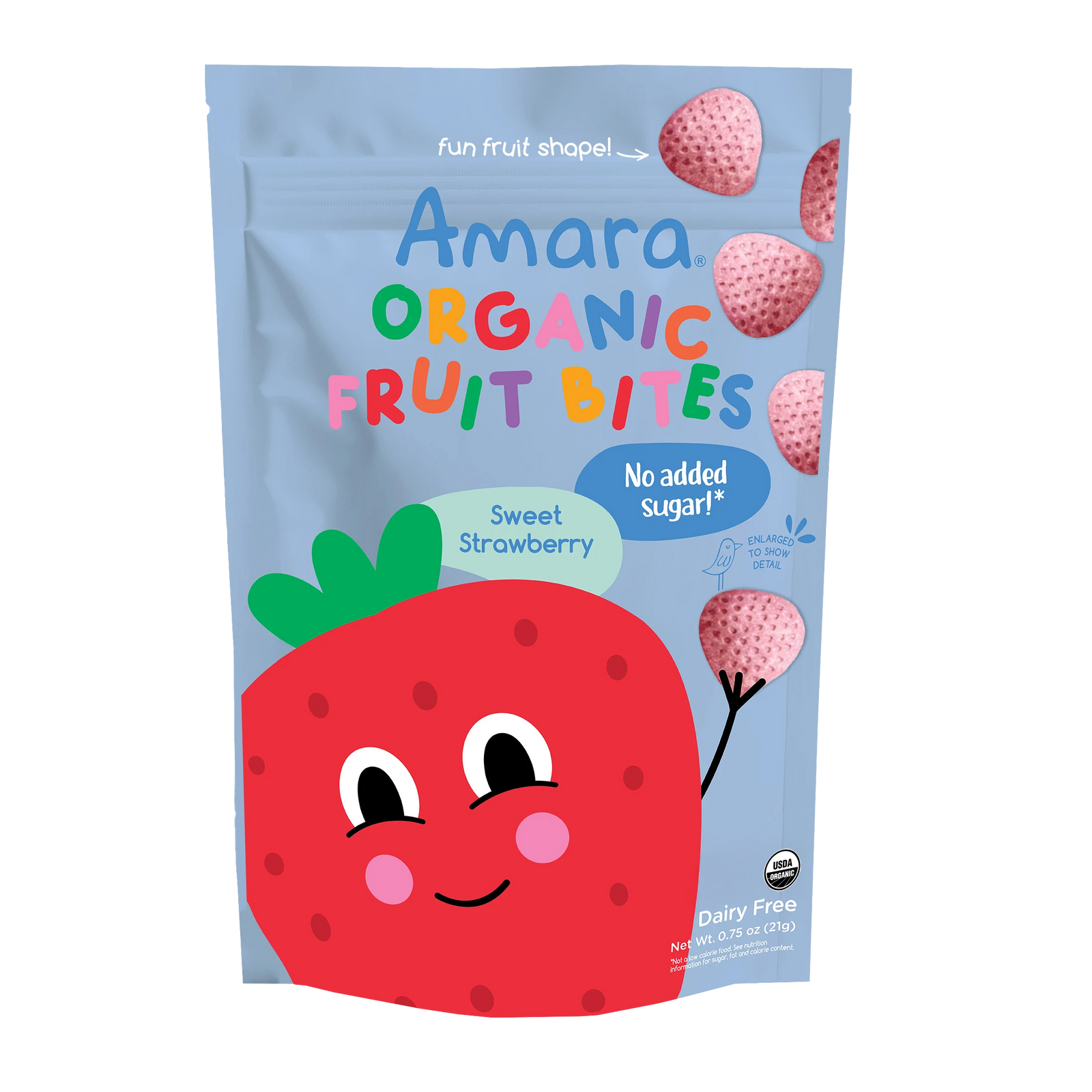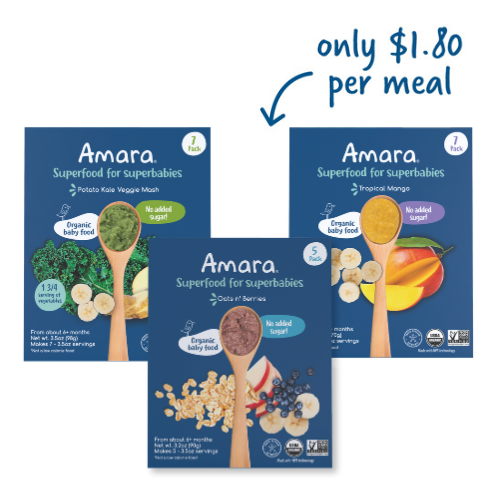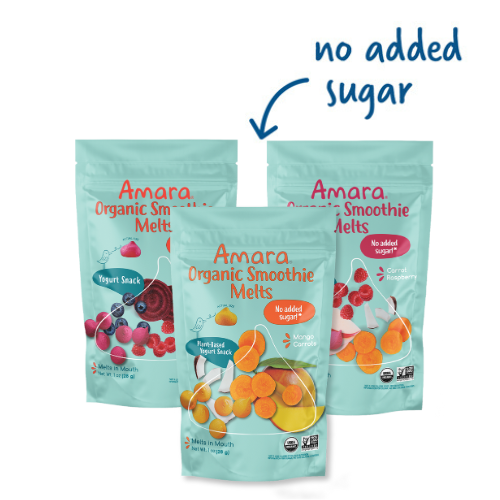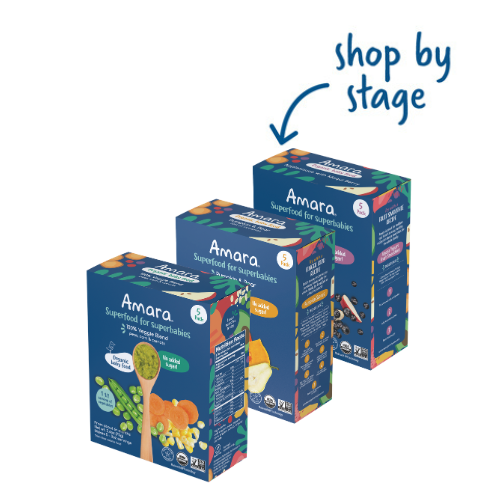Meat, In Baby Food?!
The What, How, When and Why to feed meat to your baby
A lot of people ask us why we don’t have meat options with Amara baby food. The first reason we don’t include meat in our baby food is a personal one. Working in the food industry you get to learn a lot about food and how packaged foods are made. Truth be told, the more I learn about food – the more this happens:
- I am totally convinced about what we’re doing here at Amara (seriously)
- I become more sensitive to the way meat was manufactured and the negative environmental impacts of a heavily meat-based diet.
Now, I’m far from a vegetarian (I lived in South America for years where the word “vegetarian” is almost blasphemous). But, I do believe that when you eat meat – try to find local, grass-fed meat.
The second reason we don’t do meats at Amara is far tougher than a personal dilemma, it’s a technical one. To be honest, while we have our nutrient protection process perfect for the fruits and veggies, we are still not there yet with meat products. We have a group of very smart food scientists working on it though, but until then, we’re diving in below on how you can feed your baby meat purees and the easiest way to prepare meat for your infant.
What meats can I feed my baby?
Chicken, Turkey or beef are great meats to start feeding your baby when you’re starting solids. Avoid deli, lunch meats, bacon or hot dogs because these meats contain preservatives, additives and often times added sodium that are not recommended for a baby before 12 months old. Plus, did you know that the average hot dog contains under 6% of actual meat (eek!)?
How can I feed my baby meat?
Whatever meat you decide to start with your baby (chicken, turkey, beef, etc.) – make sure that it’s fully cooked and there are no “pink” areas left. Babies do not need salt or seasonings, so just baking it in the oven alone or putting it in your slow cooker with a bit of water is perfect.
Once the meat is cooked, you can blend meat into a homemade puree with your blender. You can blend it with water, breast milk or formula to get it to the texture you want for your baby. If it’s your baby’s first time eating meat – remember that it can take up to 10 tries to introduce a new flavor or texture to your baby – don’t give up!
A lot of parents put their meat in the blender and blend in veggie or fruit purees. Some of the best recipes to introduce baby to meat we’ve seen are:
- Chicken blended with Amara Tropical Mango
- Beef blended with Pumpkin squash
- Turkey blended with Sweet Potato Raspberry
When can I feed my baby meat?
While meat can be introduced as a first food, in the US most parents introduce meats between 7-8 months of age. That being said – each baby is so different so talk to your pediatrician if you’re concerned about when the best time to introduce meat for your baby is.
The common perception around meat is that it’s harder for your baby to digest but studies show that cooking and pureeing meat actually breaks down its fibers and connective tissues which makes it easier for baby to digest.
Why feed meat to your baby?
The first 2 years are CRITICAL to developing heathy food habits for your baby and to shape the way your baby eats, thinks, and develops later on in life. No pressure, right? The good thing is that your baby doesn’t need the fancy clothes, expensive strollers, and stylish onesies – you have everything they need already. One of the things that has a huge impact on their future development is the food they eat.
Meat is a good source of iron, and iron is one of the key nutrients for your baby’s brain development. Iron helps create a protective coating that surrounds nerve fibers in the brain. If you don’t have enough of the coating (called myelin) – your brain can’t function at full capacity. We weren’t joking when we mentioned that the food you eat can affect the way you think!
There are two kinds of iron sources: heme iron (animal sources) and non-heme iron (plant sources). Heme iron sources are more easily absorbed into your body, but if your baby is a vegetarian, here are some great iron-rich, non-heme sources for your baby and their brain development:
- Green leafy vegetables (like kale!)
- Beans – lentils, black beans you name it
- Cereals – oats, amaranth, quinoa
- Nuts & seeds: sesame, poppy seed, flax
Now, since the jarred baby food meat usually looks closer to cat food than something I’d want to feed my baby, homemade baby food pureed meat seems like the best option when you’re trying to introduce meat to your baby. But, sometimes making meat at home can feel intimidating – getting the right texture for your baby or finding the right baby food recipe with meat seems complicated, right?
Here are my favorite meat baby food recipes:
Recipes Ideas for meat with my baby:
Beef and Applesauce Baby Puree
- Put ground beef in a pan with a bit of water
- Cook until meat is thoroughly heated and juices run clear
- When meat is cool, put meat in a blender or food processor
- Add a bit of water and 1 pouch of Amara Applesauce in the blender
- Blend, adding water, breast milk or formula to thin to your desired consistency
- Serve!
Chicken and Tropical Mango Baby Puree
- Cook ¼ cup chicken breast in a pan either on the stovetop or your slow cooker with a little bit of water
- When chicken is thoroughly cooked (165F) and cooled, add to a blender or food processor.
- Add a bit more water, breast milk or formula and 1 pouch of Amara Tropical Mango in the blender
- Blend, adding water, breast milk or formula to thin to your baby’s desired consistency
- Serve!
As your baby starts to learn to chew, you can feed meat in long strips (baby led weaning style) or chopped up pieces of cooked meats. Just make sure you’re always close by as your baby gets used to new textures and swallowing.
Homemade baby food is always the best- but when homemade baby food is more of a dream than a reality – you can count on Amara baby food to make homemade, possible.
Feeding our Future Foodies
You’ve probably heard me say that if we feed our future foodies real foods, we can change the way our future generations eat – and think. We know that food preferences are created in early age, so let’s teach our babies the taste, texture and nutrients of fresh.
If you’re looking for good sources of protein for your baby – these are my two favorite proteins. These flavors are both 100% veggies and always organic:










Leave A Comment